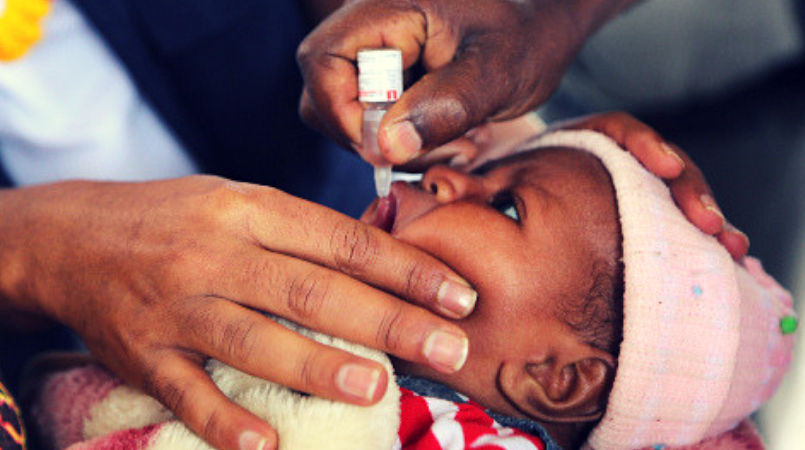
Papua New Guinea has vaccinated 3.1 million children under 15 years old in a nationwide polio vaccination conducted in the 22 provinces of the country.
The biggest polio vaccination campaign to be implemented in PNG mobilised more than 9,000 health workers and volunteers.
“As of 31 October 2018, we have immunised 3,112,035 children under 15 years old against polio, and this had been made possible through the hard work and dedication of our polio workers on the ground,” said the Secretary of the National Department of Health (NDOH), Pascoe Kase.
“I commend the leadership of the provincial health agencies and emergency operations coordinators for effectively launching and managing a very challenging response operations.”
A series of polio vaccination campaigns are being conducted in Papua New Guinea following the declaration of the Public Health Emergency on 26 June, 2018, when it was confirmed that poliovirus is circulating in the country.
Three provinces of Morobe, Madang and Eastern Highlands were covered in the polio campaign in July while nine provinces of Morobe, Madang, Eastern Highlands, Enga, Simbu, Southern Highlands, Western Highlands, Jiwaka and Hela were covered in the polio campaign in September.
Based on the data submitted to date, most of the provinces have reached more than 80 percent overage rates while a number of them had even gone beyond 100 per cent.
“This just shows that Papua New Guinea can improve our vaccine coverage and protect our children if we commit to do so. I urge all the provinces to continue the good work they are doing and to ensure all children are fully immunized against polio,” added Secretary Kase.
“Launching a nationwide campaign with short preparation was very resource- and labor-intensive, but knowing that we immunised more than 3 million children against polio makes it all worth it,” said Dr Luo Dapeng, WHO Representative in Papua New Guinea.
“I commend the leadership of the Government, the National Department of Health, the provincial health agencies and the polio workers in every village and health facility for rising up to the challenge and delivering results. But the work is not yet done, we have more campaigns coming up and we need to keep going.
“It is critical that we sustain this momentum and vaccinate every last child against polio.”
The enhanced surveillance continues to detect polio cases. Three additional polio cases have been confirmed recently in Jiwaka, Southern Highlands and Gulf. To date, there have been 21 polio cases in the country affecting nine provinces: Eastern Highlands (6), Morobe (3), Enga (3), Madang (3), Jiwaka (2), National Capital District (1), East Sepik (1), Southern Highlands (1) and Gulf (1).
Based on genetic analysis, the new cases are linked to the ongoing polio outbreak in Papua New Guinea.
With technical and financial support from the World Health Organization (WHO), a Polio Emergency Operations Center (EOC) has been established in all the provinces of Papua New Guinea to serve as the hubs to manage the day-to day operations for the outbreak response. Enhanced surveillance system to detect suspected polio cases is also in place. To equip polio workers on the campaign, social mobilization training was conducted by NDOH, with support from National Department of Health, UNICEF, WHO and other local partners.
“We appreciate NDOH’s technical leadership in integrating vitamin-A supplementation in the second round of nationwide polio campaign. Vitamin A is an essential micro-nutrient that boosts children’s immunity and prevents childhood night blindness,” said UNICEF’s Chief of Health Programme, Dr. Monjur Hossain.
“UNICEF has made available 1.38 million Vitamin A capsules to be given to a targeted 1.22 million children from six months to five years so we appeal to families and communities to ensure young children in this age range receive Vitamin A as well as polio vaccination during this campaign round.”
The next round of the nationwide polio vaccination campaign is scheduled on 29 October – 11 November in the National Capital District and on 5-18 November 2018 for all the other provinces. The target population for the polio vaccination will be all children under 15 years old.
It is reiterated that the children under 15 years old need to be vaccinated again for the November round EVERY time the polio vaccine is offered to ensure full protection.
In addition to polio vaccine, all children 6-59 months will also be given Vitamin A supplement unless they have received it less than one month before. Both UNICEF and WHO representatives appealed to parents and caregivers to also ensure that all children 6-59 months receive a vitamin capsule protect them from severe measles complications, night blindness and gastrointestinal disorder. Vitamin A also boosts children’s immunity.
The outbreak response plan of Papua New Guinea includes three main components: (1) supplementary immunization activities (four sub-national and national vaccination rounds); (2) enhanced surveillance; and (3) communication. The total estimated budget for the plan is US$ 18 million, against which the Government has committed approximately US$2.2 million (PNG Kina 6.7 million), releasing K2 million for the first and second rounds of the vaccination campaigns.
Financial support for the outbreak response includes the Bill & Melinda Gates Foundation, Rotary International, United States Agency for International Development (USAID), Canada, the Republic of Korea, United Kingdom and Australia.
The Global Polio Eradication Initiative (GPEI), spearheaded by national governments, WHO, Rotary International, the US Centers for Disease Control and Prevention and UNICEF, will continue to work with donors to secure the urgently required outbreak response funding.
(WHO picture)
